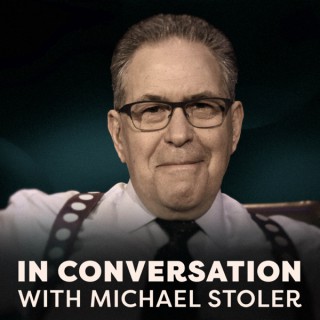CUNY TV's Twilight Talks
Follow CUNY TV's Twilight TalksTwilight Talks is a series of conversations with arts and culture professionals about their work and unique perspectives on contemporary life. Born out of the new political reality — post-election 2016 — the talks are held at twilight overlooking New York City’s West Side . Twilight Talks is produc…
- Mar 25, 2023 LATEST EPISODE
- monthly NEW EPISODES
- 13m AVG DURATION
- 74 EPISODES
More podcasts from CUNY TV
Latest episodes from CUNY TV's Twilight Talks

Goldberg mines queer and trans archives, connecting artists and organizers from previous generations to today's LGBTQ+ community.

Villalobos describes performing music with his brothers as a form of jubilant activism.

Perlin discusses her latest film "Bunker" and other remnants of Cold War America.

Photographer Mary Ellen Bartley concentrates on books as an approach to still life.

Zanisnik reenacts family history and walks the Meadowlands in search of enlightenment.

Whitaker redraws the boundaries of photographic realism to create alternate social truths.

Oursler talks about spirits, enchantment and alternative belief systems.

Marmorek considers love and desire as unruly elements in modern society.

Uchizono talks about movement as a medium for personal and political transformation.

Makos recounts the unique social creativity of the Factory and his friendship with Andy Warhol.

Kevin Moore talks to Artist Em Rooney. Rooney considers our place as biological, sentient beings inhabiting industrial environments.

Kevin Moore talks to Visual Artist and Filmmaker Rosa Barba. Barba talks about the versatility of film and its aptness for contemplating the modern world.

Epstein captures the beauty and terror of the world in photographs rich in political import.

Haendel invests meaning in slow drawing as a form of homage to the social and spiritual work of his subjects.

Silas Riener talks about dance traditions, broadening gender categories through dance, and improvisational performance as a forum on social cohesion.

Photojournalist Ozier Muhammad reminisces about growing up among the Nation of Islam, bearing witness to famines, earthquakes, and political campaigns, and the necessity of seeking inspiration.

McGinty expresses mixed feelings about cat litter, wellness advice, and Clint Eastwood.

Chidester talks about growing up in the mountains, performing on cruise ships, and the progress of millennials.

Kevin Moore talks with Rivka Galchen, Dasha Shishkin, Reiner Leist, Leo Rubinfien, Julie Curtiss, Alex Rosenberg, A. K. Burns, Ankit Shrestha, Francis Cape, Moyra Davey, Vera Iliatova, Nilko Andreas, Ben Gould, Hugo Montoya, Anne Lindberg and May Chatham

Artist Dasha Shishkin shares her delight in absurdity, decadence, and flawed materials.

Writer Rivka Galchen talks about enigmatic terrains, from offbeat neighborhoods to scientific mysteries and arbitrary authority.

Leo Rubinfien recounts his firsthand experience of the World Trade attacks and the years-long attempt to make sense of it.

Reiner Leist talks about life-altering moments, from large-scale traumatic events to daily, barely noticed routines

Art publisher and appraiser Alex Rosenberg reminisces about his long life and relations with notable artistic and political figures as well as his involvement with Cuba and Israel.

Artist Julie Curtiss talks about her multicultural upbringing and her attraction to French Surrealism and dark female archetypes.

Ankit Shrestha talks about the importance of busking, doing cover tunes, and developing an international audience.

A. K. Burns asks: what is valued? must art always be a salable object? and how do physical spaces direct our lives?

Moyra Davey demonstrates the power of triangular thinking, bringing together personal, historic, and artistic narratives that examine life in unique ways.

Francis Cape discusses woodworking as an angle on social injustice and the persistence of utopian ideals in late capitalist society.

Nilko Andreas talks about his musical influences, from classical to Colombian folk music, and introducing those repertoires to audiences in New York.

Vera Iliatova recalls the last days of the Soviet Union and adapting to life in New York in relation to her paintings, which depict teenage girls caught in a maelstrom of nostalgia.

Hugo Montoya details how a lifestyle of beachcombing and photographing led to a discipline of making simple, gestural sculptures out of common materials and found objects.

Ben Gould tells how a recent diagnosis of Tourette Syndrome precipitated a career shift to performance art, through which he mines the expressive potential of his body's unpredictable energies.

Mary Chatham explains her process as discovery through materials, leaving preconceived ideas at the studio door, and embracing the in-between.

Anne Lindberg talks about the temporal effects of landscape, literature as confidence, and discipline as generators for her work.

Coversations with Tabitha Soren, Carroll Dunham, Hugh Hayden, Lesley Lokko, Cheryl Donegan, Kevin Bewersdorf, Nanette Burstein, Mark Dion, Elaine Mayes, Olaf Breuning, Heidi Ewing, Chris Martin, Luc Sante, Laurie Lambrecht, Chelsea Culprit & Mary Carlson.

Culprit talks about the expectations placed on female identity and visual strategies for overturning gender stereotypes.

Carlson shares her enthusiasm for the lives of female saints and their various depictions in Medieval and Renaissance art.

Lambrecht elaborates a mindset of careful observation, knitting, and playing with the edges of the natural and social orders in which we live.

Sante discusses teaching writing, anarchist legacies, and valuing histories of everyday life--including his own--through old photographs and ephemera.

Martin recounts his years as an art therapist and learning to find--and give--pleasure through his own painting.

Ewing describes the free license granted by documentary filmmaking and getting into the headspace of different groups and characters.

















